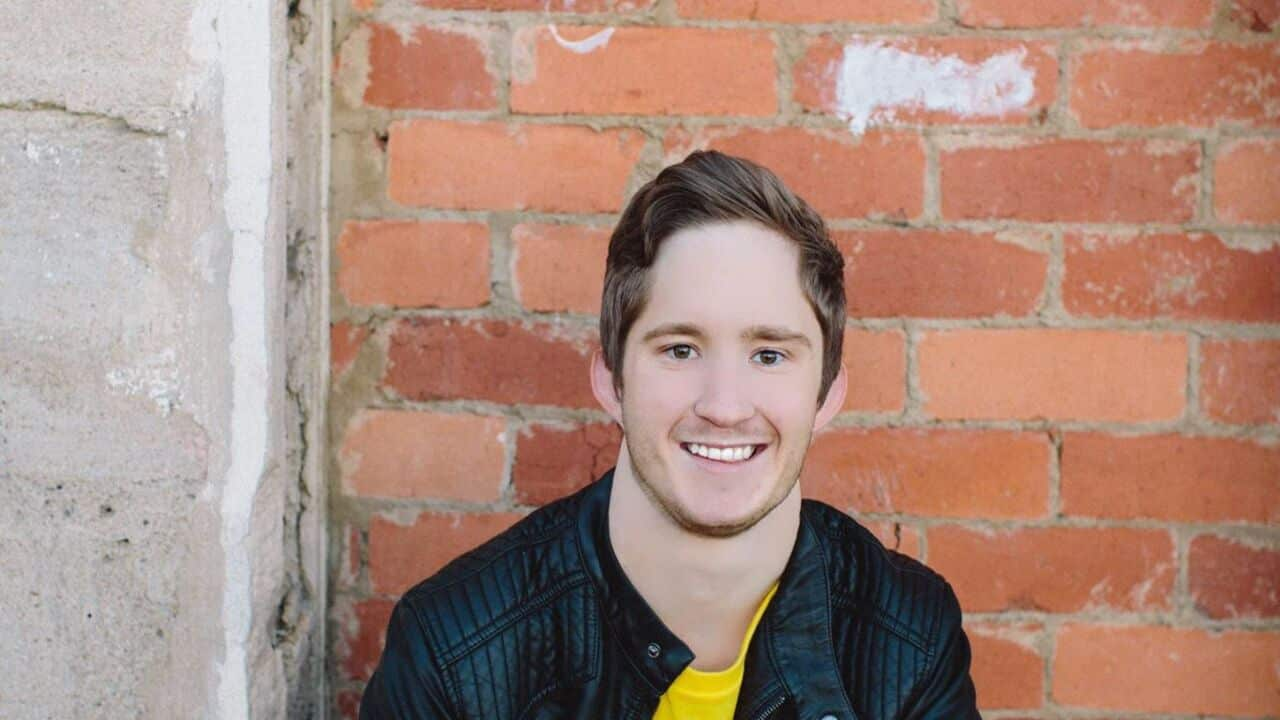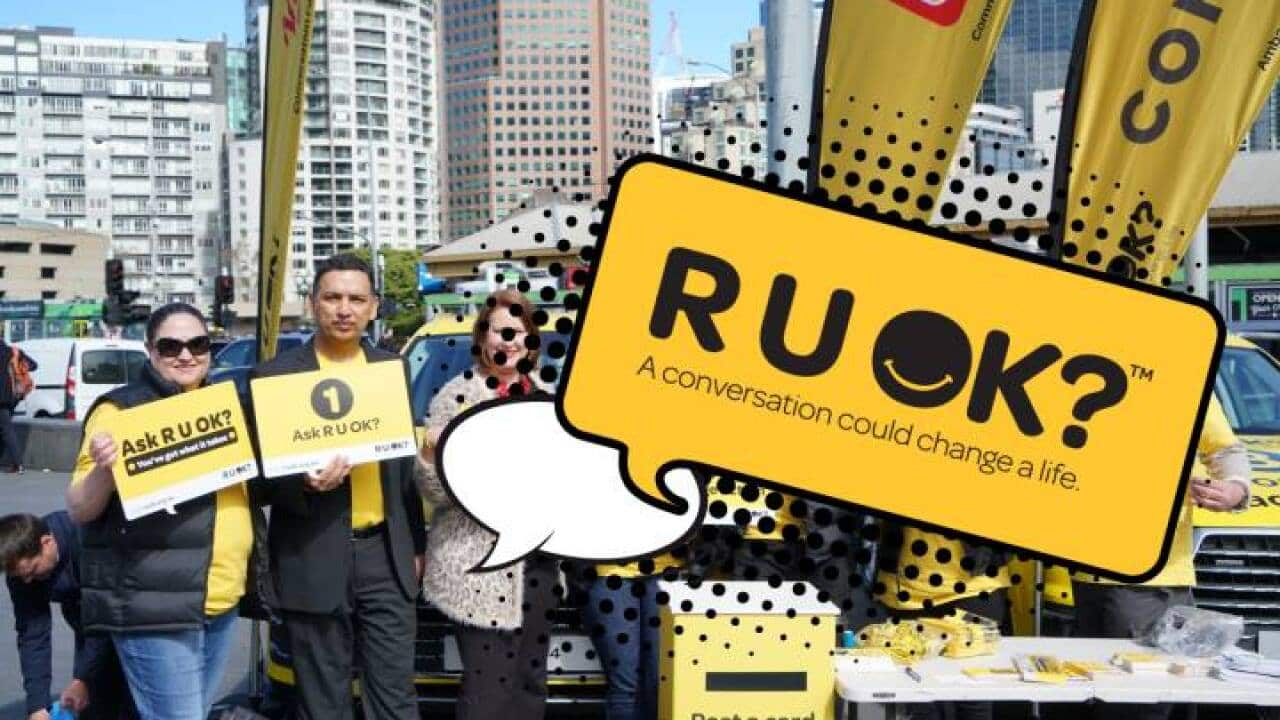Suicide is the leading cause of death for Australians between 15 and 44. For young Indigenous men, it's the highest in the world, according to the latest Australian Youth Development Index report.
The R U OK Conversation Convoy started spreading the word from the heart of our nation, Uluru, and across to other towns and cities, including - Dubbo, Bourke, Townsville and Sydney. Its campaign slogan was ‘You've got what it takes to ask RU OK?’.
Brendan Maher, CEO of the R U OK Campaign, told NITV News this year’s campaign is focusing on just 4 simple steps to assist in reaching out to someone struggling with life issues.
"We want to really push 4 steps to having a conversation with someone you're really worried about. That's the purpose of this year's campaign hence our four yellow RU OK vehicles, that is to ask, to listen, to encourage action and to check in.
“We're all well positioned to notice a change in someone, a friend or family member. Maybe they're not turning up to things, not answering their phone and we really want to activate, give people a bit of a road map on how do I start?” he said. Mr Maher also emphasised that the conversations aren’t always going to be easy.
Mr Maher also emphasised that the conversations aren’t always going to be easy.

Uncle Riverbank Frank addressing the Dubbo R U OK? Conversation Convoy event. Source: Supplied
“One in three Australians are telling us they don't feel comfortable to reach out to someone they're worried about.”
While suicide is believed to have been a rare occurrence among the Aboriginal and Torres Strait Islander communities in pre-colonial times, it's become increasingly prevalent over recent decades.
Dr Vanessa Lee, from the Wik and Meriam Nations, a social epidemiologist, and Board Director at Suicide Prevention Australia says the high rate of suicide in Indigenous communities is increasingly alarming.
"We are only 3 per cent of the whole Australian population, yet 50 per cent under the age of 22, and we have the highest suicide rates in our youth. In some areas in Australia, we have highest suicide rates in the world.”
“NSW [is] seventh highest in the world, Queensland fourth highest in the world, and then across to WA … it's almost 1st and 2nd highest in the world. What are we doing in this country? Suicide isn't an ATSI problem, it's an Australian problem, it's a world problem. What are we doing that's so bad that young people don't have the will power to live anymore?" she questions. Brendan Maher recognises the importance of getting the message right and working with the right people by enlisting Indigenous Ambassadors to join their campaign in communities. Some of the biggest names include Riverbank Frank Doolan, Stephen Oliver, David Lydiard and Jake Gablonski.
Brendan Maher recognises the importance of getting the message right and working with the right people by enlisting Indigenous Ambassadors to join their campaign in communities. Some of the biggest names include Riverbank Frank Doolan, Stephen Oliver, David Lydiard and Jake Gablonski.

The R U OK? Conversation Convoy aims to inspire everyone around the country to invest more time in starting an important conversation. Source: NITV News
The RU OK CEO has also been inspired by Indigenous locals he’s encountered along the way.
"We met this amazing woman in Katherine who talked about this idea that we all have a fire. ‘Use that fire to light the fire of someone else’... such a nice anecdote of what we can do for all human beings, for All Australians."
Indigenous suicide prevention program, Deadly Thinking, also enlists Indigenous locals to devise and implement services.
Dr Jennifer Bowers, CEO of the Deadly Thinking Program, says what sets their program apart is that it’s a prevention program designed by and for Indigenous people.
“It talks about the stigma. It talks about some of the risks associated by living in rural and remote Australia. It talks about some symptoms and signs of social and emotional wellbeing and suicide. We then also talk about some of the sorts of things that affect people, like drugs and alcohol, but underlying all this is self-help strategies, how to look after yourself, recognise problems and what to do about it,” she explains.
RELATED ARTICLE

R U OK? Change the way a person sees tomorrow
Yvonne Weldon, NSW Metropolitan Aboriginal Land Corporation Chairperson, believes Indigenous people living in urban areas are also in need of support. She says the R U OK campaign is the first step in raising awareness and starting the conversation.
"There's a lot of issues. It's not just about whether it's remote or rural. It's also about the urban issues which impact urban Aboriginal people.
“I think that R U OK and starting that yarn is a start. We're often there for each other but we don't have the serious yarn and I think that to be able to ask that simple question and continue to let people know that they're there for them, we could have the answers that are so desperately needed," she says.
RELATED CONTENT

Depression, racism and the need to open up on ‘R U OK? Day’
The NSW State government says it’s also doing its bit. It has provided an 8 million dollar suicide prevention fund targeting Indigenous youth.
"I'm really excited there is a program we have funded out in far West to specifically working with young Aboriginal and Torres Strait Islanders to tackle suicide in that region," NSW Minister for Mental Health Tanya Davies told NITV News.
Despite the increased challenges faced by Indigenous Australians, RU OK Ambassador Jodhi Meares stresses that mental health issues could affect anyone in any community.
"We all go through a hard time ... You need to be there for your mates ... ask RU doing OK?"
But for Indigenous communities across the country, there may be more incisive questions about the challenges they face on a daily basis.
Dr Vanessa Lee says there are deeper issues that need to be dealt with before the situation can improve.
"When 2 cultures collide the question is how many more suicides are we going to see? It would be lovely to say that the cultures could actually work together, and I think they could, but the reality we face is government policies for Aboriginal and Torres Strait Islanders is so different to the rest of Australia, and that's a reality. That's not a joke, that’s a reality!
“We see that evidence highlighted throughout the NT with the Basics card. We see that evidence in regional, rural and remote communities. We see that evidence in NSW. What's OK in Sydney is not OK in Toomla," she concludes.
In a country where First Nations Peoples suffer the highest suicide rates in the world, to ask R U OK may not be the solution, but it's a start.
Readers seeking support and information about suicide prevention can contact:
Lifeline on 13 11 14.
Suicide Call Back Service 1300 659 467
MensLine Australia 1300 78 99 78










